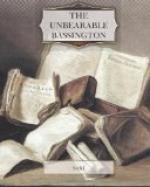“We met at Grindelwald, you know. He always calls me his Ice Maiden because we first got to know each other on the skating rink. Quite romantic, wasn’t it? Then we asked him to tea one day, and we got to be quite friendly. Then he proposed.”
“He wasn’t the only one who was smitten with Suzette,” Mrs. Brankley hastened to put in, fearful lest Elaine might suppose that Egbert had had things all his own way. “There was an American millionaire who was quite taken with her, and a Polish count of a very old family. I assure you I felt quite nervous at some of our tea-parties.”
Mrs. Brankley had given Grindelwald a sinister but rather alluring reputation among a large circle of untravelled friends as a place where the insolence of birth and wealth was held in precarious check from breaking forth into scenes of savage violence.
“My marriage with Egbert will, of course, enlarge the sphere of my life enormously,” pursued Suzette.
“Yes,” said Elaine; her eyes were rather remorselessly taking in the details of her cousin’s toilette. It is said that nothing is sadder than victory except defeat. Suzette began to feel that the tragedy of both was concentrated in the creation which had given her such unalloyed gratification, till Elaine had come on the scene.
“A woman can be so immensely helpful in the social way to a man who is making a career for himself. And I’m so glad to find that we’ve a great many ideas in common. We each made out a list of our idea of the hundred best books, and quite a number of them were the same.”
“He looks bookish,” said Elaine, with a critical glance at the photograph.
“Oh, he’s not at all a bookworm,” said Suzette quickly, “though he’s tremendously well-read. He’s quite the man of action.”
“Does he hunt?” asked Elaine.
“No, he doesn’t get much time or opportunity for riding.”
“What a pity,” commented Elaine; “I don’t think I could marry a man who wasn’t fond of riding.”
“Of course that’s a matter of taste,” said Suzette, stiffly; “horsey men are not usually gifted with overmuch brains, are they?”
“There is as much difference between a horseman and a horsey man as there is between a well-dressed man and a dressy one,” said Elaine, judicially; “and you may have noticed how seldom a dressy woman really knows how to dress. As an old lady of my acquaintance observed the other day, some people are born with a sense of how to clothe themselves, others acquire it, others look as if their clothes had been thrust upon them.”
She gave Lady Caroline her due quotation marks, but the sudden tactfulness with which she looked away from her cousin’s frock was entirely her own idea.
A young man entering the room at this moment caused a diversion that was rather welcome to Suzette.
“Here comes Egbert,” she announced, with an air of subdued triumph; it was at least a satisfaction to be able to produce the captive of her charms, alive and in good condition, on the scene. Elaine might be as critical as she pleased, but a live lover outweighed any number of well-dressed straight-riding cavaliers who existed only as a distant vision of the delectable husband.




